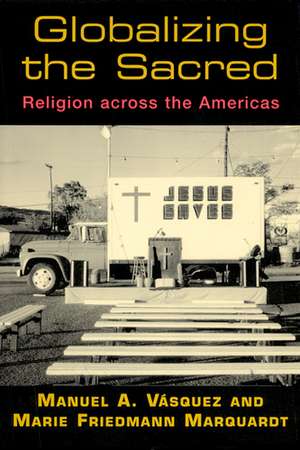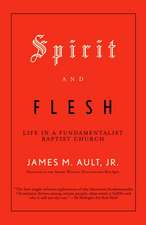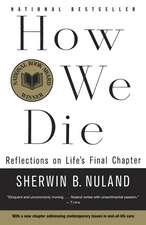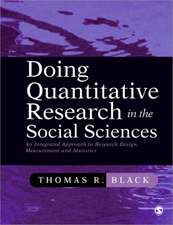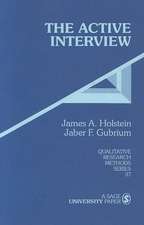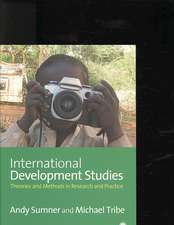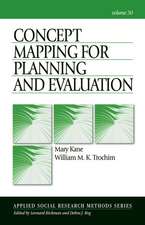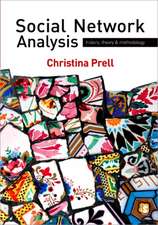Globalizing the Sacred: Religion Across the Americas
Autor Manuel A. Vásquez, Marie F. Marquardten Limba Engleză Paperback – 16 iul 2003
French and German tourists join Mexican migrant workers to venerate the image of the Virgin Mary at a strip mall in Florida; Latino gang members, deported from the United States to home countries they barely know, find Jesus in transnational churches; U.S. evangelicals use electronic media to preach a “neo liberal” gospel of wealth and health to landless peasants in remote indigenous villages in Guatemala. These are just some examples of how religion in the Americas today intersects in complex ways with the economic, political, and cultural dimensions of globalization.
Drawing on case studies in the United States and Latin America, Manuel A. Vásquez and Marie Friedmann Marquardt explore the evolving roles of religion in the Americas in the face of globalization, transnational migration, the rapid growth of culture industries, the rise of computer mediated technologies, and the crisis of modernity. Combining ethnographic research in local congregations, studies of material culture and sacred space, textual analyses, and approaches to mass and electronic media, the authors challenge dominant paradigms in sociology of religion, such as the secularization and rational choice models. Further, the book offers alternative theoretical and methodological tools to understand the increasing complexity of religious life in the Americas.
By illustratingthe challenges that scholars and students must confront in order to understand the complexity of today’s religious landscape, Globalizing the Sacred makes both important theoretical and methodological contributions to the study of religion’s role in social change.
Drawing on case studies in the United States and Latin America, Manuel A. Vásquez and Marie Friedmann Marquardt explore the evolving roles of religion in the Americas in the face of globalization, transnational migration, the rapid growth of culture industries, the rise of computer mediated technologies, and the crisis of modernity. Combining ethnographic research in local congregations, studies of material culture and sacred space, textual analyses, and approaches to mass and electronic media, the authors challenge dominant paradigms in sociology of religion, such as the secularization and rational choice models. Further, the book offers alternative theoretical and methodological tools to understand the increasing complexity of religious life in the Americas.
By illustratingthe challenges that scholars and students must confront in order to understand the complexity of today’s religious landscape, Globalizing the Sacred makes both important theoretical and methodological contributions to the study of religion’s role in social change.
Preț: 310.34 lei
Nou
Puncte Express: 466
Preț estimativ în valută:
59.39€ • 63.50$ • 49.51£
59.39€ • 63.50$ • 49.51£
Carte tipărită la comandă
Livrare economică 17 aprilie-01 mai
Preluare comenzi: 021 569.72.76
Specificații
ISBN-13: 9780813532851
ISBN-10: 081353285X
Pagini: 272
Dimensiuni: 152 x 229 x 18 mm
Greutate: 0.43 kg
Ediția:None
Editura: Rutgers University Press
Colecția Rutgers University Press
ISBN-10: 081353285X
Pagini: 272
Dimensiuni: 152 x 229 x 18 mm
Greutate: 0.43 kg
Ediția:None
Editura: Rutgers University Press
Colecția Rutgers University Press
Notă biografică
Manuel A. Vásquez is an associate professor of religion at the University of Florida, Gainesville. He is the author of The Brazilian Popular Church and the Crisis of Modernity and is the co-editor of Christianity, Social Change, and Globalization in the Americas (Rutgers University Press).
Marie Friedmann Marquardt is a Ph.D. candidate in the sociology of religion at Emory University.
Marie Friedmann Marquardt is a Ph.D. candidate in the sociology of religion at Emory University.
Cuprins
Acknowledgements
Introduction
1 The Limits of Dominant and Emerging Models
2 Theorizing Globalization and Religion
3 Miracles at the Border: A Genealogy of Religious Globalization
4 Crossing the Electronic Frontier: Religious Congregations and the Internet
5 Saving Souls Transnationally: Pentecostalism and Youth Gangs in El Salvador and the United States (with Ileana Gomez)
6 A Continuum of Hybridity: Latino Churches in the New South
7 Premodern, Modern, or Postmodern?: John Paul II's Civilization of Love
8 "Blitzing" Central America: The Politics of Transnational Religious Broadcasting
Conclusion
Notes
Works Cited
Index
Introduction
1 The Limits of Dominant and Emerging Models
2 Theorizing Globalization and Religion
3 Miracles at the Border: A Genealogy of Religious Globalization
4 Crossing the Electronic Frontier: Religious Congregations and the Internet
5 Saving Souls Transnationally: Pentecostalism and Youth Gangs in El Salvador and the United States (with Ileana Gomez)
6 A Continuum of Hybridity: Latino Churches in the New South
7 Premodern, Modern, or Postmodern?: John Paul II's Civilization of Love
8 "Blitzing" Central America: The Politics of Transnational Religious Broadcasting
Conclusion
Notes
Works Cited
Index
Recenzii
Globalizing the Sacred breaks new ground in our understanding of the transnational role of religion. Based on case studies in the Americas, this book challenges modernist assumptions about the ways Christians communicate and interact in an increasingly global world. Vßsquez and Marquardt demonstrate a sophisticated knowledge of transnational theory as they engage debates related to hybrid identities, the transformative impact of the Internet, and the increasing flow of migrants across national borders.
"A magnificent exploration of the multiple ways local religion shapes and is shaped by its institutional, regional, and global contexts. Locating their analysis at the crossroads between religious studies and the emerging literature on globalization, Vßsquez and Marquardt masterfully interweave theory and case studies to provide essential insights for understanding religion and social change in the twenty-first century."-,
Descriere
By illustratingthe challenges that scholars and students must confront in order to understand the complexity of today’s religious landscape, Globalizing the Sacred makes both important theoretical and methodological contributions to the study of religion’s role in social change.
